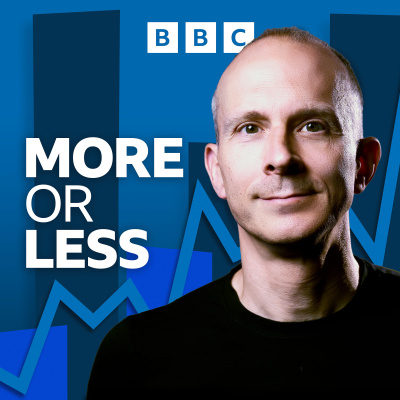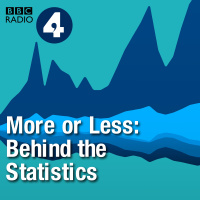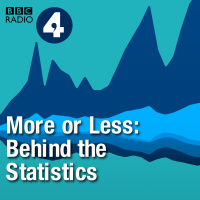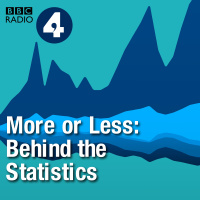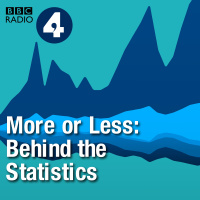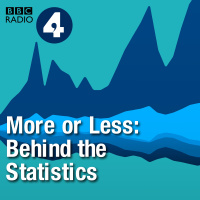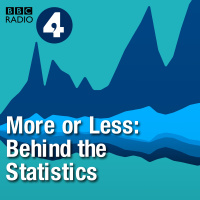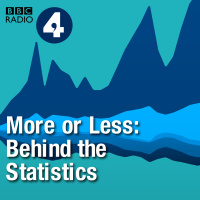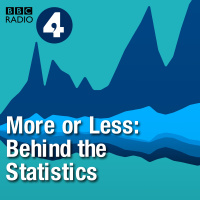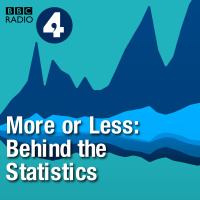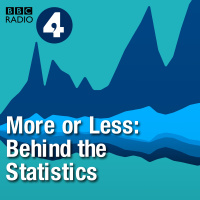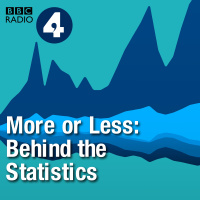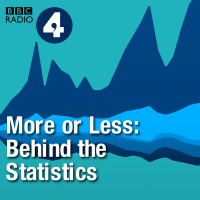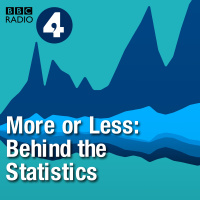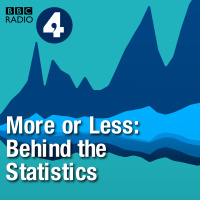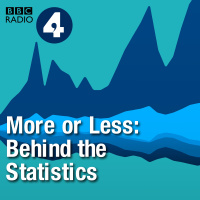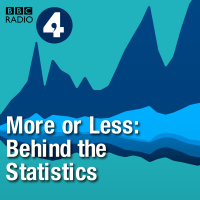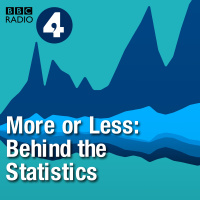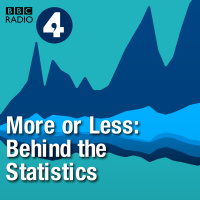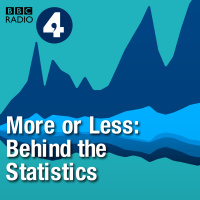Synopsis
Tim Harford and the More or Less team try to make sense of the statistics which surround us. From BBC Radio 4
Episodes
-
Are women 32% more likely to die after operation by a male surgeon?
19/01/2022 Duration: 28minAre women 32% more likely to die after operation by a male surgeon? Headlines asserting this were shared across social media recently - but the truth is a bit more complicated.We compare the price and the quality of the UK’s Test and Trace system with that of Germany and check on what’s happening to the Covid death toll during the Omicron wave.And we investigate the worrying statistic that one in ten people are planning to start a podcast in the coming year.
-
QAnon: Did 365,348 children go missing in the US in 2020?
16/01/2022 Duration: 08minIn December, Republican politician Lauren Boebert tweeted the claim that ‘365,348 children went missing in 2020’. This is a shocking statistic but is it true and does it mean what we think it means? We speak to Gabriel Gatehouse, international editor of Newsnight, who has been investigating conspiracy theories including the Qanon conspiracy theory for a new podcast, The Coming Storm.
-
Omicron, pandemic birth rates and boosters
12/01/2022 Duration: 27minThe pandemic seems to be entering a new phase as Omicron has taken hold. Is it milder? And how might we make decisions based on the latest data?Predictions that lockdowns might lead to a baby boom have proven wrong - in fact fertility is falling.We re-examine a baffling claim about the number of children being abducted every year in the US after claims by a Republican politician on social media, and we run our statistical measuring tape up the inside leg of the government’s promise to give everyone a booster jab before New Year’s Day.
-
How much plastic is in the Ocean and can Mr Beast make a difference?
09/01/2022 Duration: 08minIn October of last year popular Youtubers Mark Rober and the enigmatically named Mr Beast pledged to remove 30 million pounds of plastic from the Ocean – if they could raise $30 million dollars. A dollar per pound of plastic sounds like a fairly good deal, but how much plastic is out there and will they actually be removing anything from the Ocean at all?(Image: Sahika Encumen dives amid plastic waste in Ortakoy coastline: photo by Sebnem Coskun/Anadolu Agency via Getty Images)
-
Will the population of Nigeria be larger than Europe’s?
02/01/2022 Duration: 08minIn recent years population growth has slowed rapidly. Experts believe that the global population will stabilise somewhere around 11 billion people. But just because global population is stabilising doesn’t mean each country is following the global trend. Some projections estimate that the population of Nigeria will increase rapidly to the point that there will be more people living in Nigeria than the whole of Europe combined. We look at the methods behind this claim.
-
Numbers of 2021
26/12/2021 Duration: 08minA guide to the most concerning, striking and downright extraordinary numbers of 2021. Tim Harford asks three More or Less interviewees about their most significant and memorable figure over the past year. From the excess death toll of Covid-19; to declining total fertility rates, and a spike in the concentration of carbon dioxide in the atmosphere, we showcase the numbers that tell us something about the year gone by. During this programme, we speak to Hannah Ritchie, head of research at Our World in Data and senior researcher at the University of Oxford; Marina Adshade, Economics Professor at the University of British Columbia; and Heleen De Coninck, professor at Eindhoven University of Technology, and a lead author on several reports by the Intergovernmental Panel on Climate Change.
-
The psychological economics of gift giving
19/12/2021 Duration: 08minChristmas, the most wonderful time of the year – if you have something to sell that is. Every year we waste hundreds of dollars on gifts that aren’t appreciated, but how can you ensure that the gifts you buy hit the mark every time? We speak to behavioural scientist Professor Francesca Gino to find out more then use our newfound knowledge to exam an old Christmas classic
-
Does catching covid give you more immunity than being vaccinated?
12/12/2021 Duration: 08minImmunity to Covid-19. We've all been hoping to develop it ever since the virus emerged two years ago. Since then, a race to vaccinate the world has begun in earnest, with many countries rolling out booster shots in response to the rise of the Omicron variant. Health officials and scientists agree that vaccines are the safest way to develop immunity to the disease. But when US Congresswoman Nancy Mace took to Fox News recently, citing a study showing a whooping 27 times better immunity from natural infection than vaccination, we thought we'd better investigate. How did this study arrive at this number, and is it a fair representation of its findings?
-
Does wearing a mask halve your chances of getting Covid-19?
05/12/2021 Duration: 08minMasks, you may not have worn them before 2020 but now we’re all at it. With the rise of the Omicron variant countries have scrambled to reintroduce public health policies, among them mask wearing. Health officials and scientists agree that masks help reduce the incidence of covid19 infections – but by how much is still debated. Several newspapers recently reported that masks could cut Covid-19 infections by 53%, we look at how they came to this number and whether we should be believe it. (Image: Leon Neal/Getty Images)
-
Simpson’s Paradox: How to make vaccinated death figures misleading
28/11/2021 Duration: 08minVaccines are the best way to stop deaths and serious cases related to covid19, this is an irrefutable fact. However, recent ONS data seems to show that vaccinated people had a higher all cause death rate than unvaccinated people. Why is this data misleading? Here’s a clue: it’s to do with a quirky statistical phenomenon called Simpsons Paradox. (Image: The Simpsons / TCFFC )
-
A TikTok tale
21/11/2021 Duration: 08minNowadays if you are an academic and who needs some participants for a study you go online, but over the summer academic studies were inundated with participants who all happened to be teenage girls ... we explore how one TikTok can tip the balance of data gathering. Presenter: Tim Harford Producer: Chris Flynn(Image: TikTok logo is displayed on a smartphone screen/Getty/NurPhoto/contributor)
-
The carbon cost of breakfast at COP26
14/11/2021 Duration: 08minA French minister told people to eat fewer croissants at this year’s COP26 summit, after the menu said the carbon cost of the pastry was higher than that of a bacon roll, even if it was made without butter. Tim Harford investigates whether this claim could be true, and how the effect of food on climate change can be measured.(Image: Continental breakfast with coffee and croissants: Getty/Cris Cantón)
-
Same data, opposite results. Can we trust research?
07/11/2021 Duration: 08minWhen Professor Martin Schweinsberg found that he was consistently reaching different conclusions to his peers, even with the same data, he wondered if he was incompetent. So he set up an experiment. What he found out emphasises the importance of the analyst, but calls into question the level of trust we can put into research.Features an excerpt from TED Talks(Image: Getty/erhui1979)
-
The art of counting
31/10/2021 Duration: 08minWho is counting, why are they counting, and what are they are counting? These three questions are important to ask when trying to understand numbers, according to Deborah Stone, author of Counting, How We Use Numbers to Decide What Matters. In this episode, she explains how different ways of totting up can have real-world consequences.(Image: Betta Blue Red Veiltail/Getty Images/zygotehasnobrain)
-
The numbers behind Squid Game
24/10/2021 Duration: 08minNetflix has announced that South Korean survival drama Squid Game is its most popular series ever. We scrutinise the statistics behind the claim, and look at the odds of surviving one of the show’s deadly contests.
-
The prize-winning economics of migration and the minimum wage
17/10/2021 Duration: 08minDo immigrants drive down wages, do minimum wage increases reduce job opportunities, and do people who did well in school earn more money? These are questions that the winners of the 2021 Nobel Memorial Prize in Economics looked to the world around them for answers to. David Card, Joshua Angrist, and Guido Imbens developed ways of interpreting what they saw that changed the way economists think about what they see. In this episode of More or Less, presenter-turned-guest Tim Harford explains how.(Image: Mariel boat lift, which brought over 100,000 Cubans into the United States: Photo by Tim Chapman/Miami Herald)
-
Bonus episode: the first ever More or Less
07/10/2021 Duration: 36minA chat with More or Less's founding producer and presenter plus the first episode in full. Tim talks to Michael Blastland and Sir Andrew Dilnot about how More or Less came into being (after several rejections), whether politicians and journalists are more numerate now, and where the name come from. Then, the very first episode of More or Less, originally broadcast on Radio 4 on 13 November 2001.
-
Twenty years of More or Less
06/10/2021 Duration: 27minA look back at our origins, plus the usual mix of numerical nous and statistical savvy.It’s two decades since More or Less first beamed arithmetic into the unsuspecting ears of Radio 4 listeners. We revisit the show’s genesis with the original presenter and producer.Why are there two different figures about our vaccination rate doing the rounds and how does the UK now compare internationally?Plus listener questions on how the colour of your front door affects your house price, TVs on standby mode, and more. And we try to respond to a meteor storm of complaints about our earlier item asserting that Star Trek’s Mr Spock is in fact highly illogical.
-
The Gender Pay Gap
03/10/2021 Duration: 08minTim Harford talks to Planet Money’s Stacey Vanek Smith about the gender pay gap in the US and the UK – and how Renaissance writer, Machiavelli might be an unlikely source of inspiration for women in the workplace.
-
Is it easy being green?
29/09/2021 Duration: 29minIs our electricity extra expensive and our insulation inadequate? And a tale of tumbling trees.Internet infographics suggest we’re paying way more for our energy than countries in the EU. Are they being interpreted correctly? And what part, if any, has Brexit had to play?Insulation Britain activists have been gluing themselves to motorway slip-roads to raise awareness about poor home insulation. Their website says we have the least energy efficient homes in Europe. What’s the evidence?Plus, what do the numbers tell us about migrants trying to cross the Channel in small boats? Are stereotypes about different generations backed up by the data? And is it or is it not true that the UK has lots of trees?
